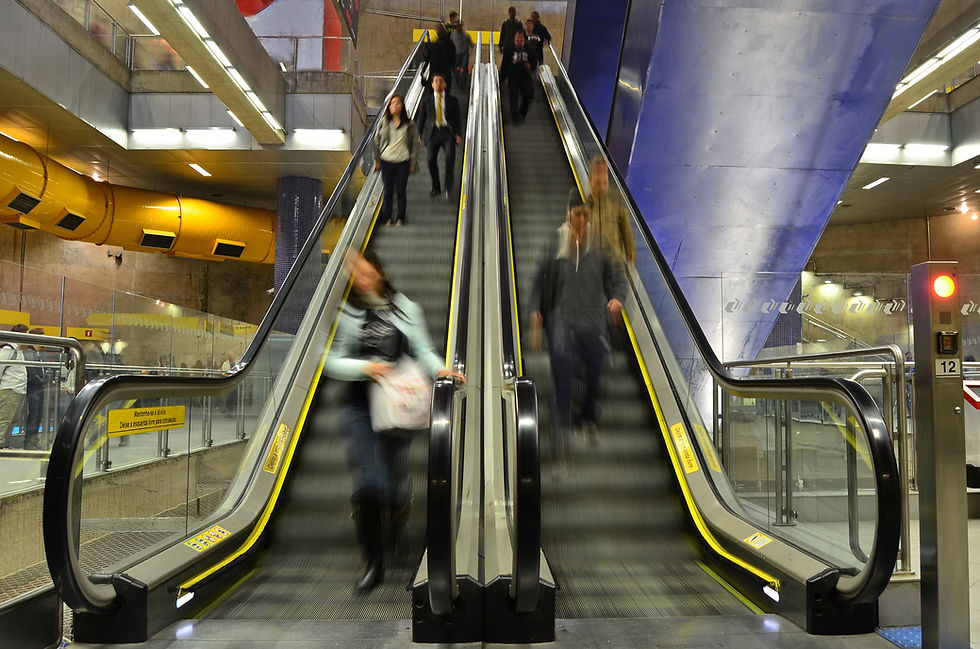
What would you do if you were stuck on an ESCALATOR? Choose the best option below for you.
A. Cry for help.
B. Start complaining.
C. Try to "fix" the escalator yourself.
D. Walk up/ down out of the escalator.
Whichever you chose, let's see what two people chose to do when they got stuck on an escalator in the commercial below.
Clearly, these two high-ranking people chose to wait and cry for help, even though the escalator just stopped and wasn't supposed to collapse. They didn't know what to do, but yelling for help and eventually sitting down, waiting for somebody to come and fix the problem. Even when support arrived, it didn't help much. And they continued to sit where they were, not knowing how and when they could get to the floor they wanted.
The Broken Escalator Theory
That Tim Piper's commercial for the Canadian company Bacel was derived from the Broken Escalator Theory. All of us, I believe, who chose D when answering the question above, know exactly what those two people should do. But why did they choose what they did and what can we learn from them?

Since its first appearance sometime at the end of the 19th century, escalators have had an easy task - bringing people from one floor to another. And they have been doing it perfectly that you can hardly see people walking up or down the stairs if there is an escalator beside. When putting their feet on an escalator, people, without any awareness, let it take charge of moving them to the other floor. People do it so often and automatically that they give up their responsibility of moving themselves, thinking that somebody will have that responsibility. So if the escalator is broken, SOMEBODY has to do something, NOT THEM.
Another explanation can be related to the Broken Escalator Phenomenon. Reynolds and Bronstein (2003) defined it as a strange feeling of physical imbalance when someone puts their first step on a broken escalator being fully aware that the escalator is still. That is because they, or their brains, are so accustomed to a moving escalator which (NOT THEM) will move them to the next floor.
What can we learn from the broken escalator?
The broken escalator parable certainly evokes many thoughts from each of us in our lives. Will we act like those two people when getting stuck on something? What lessons can be learned?
Don't be dependent on others
We are sometimes too dependent on others when fixing a problem. We effortlessly wait for their supports, and in some cases, we think it's their responsibility to solve it, despite the fact that it IS our problem. So don't wait for others, don't blame others. Instead, actively ask why it's happening and be always ready to find solutions on our own.
Relax and look into the situation
When problems take place, we tend to lose control and can't think thoroughly. We usually panic and look around, trying to find a solution. Relax!!! Sometimes, the solution is in the problem itself or even inside us. We only need to take one more step and everything's done. Remember! Everything happens for a reason and NOT a single problem has no solution.
Don't overlook opportunities
It is said that an opportunity never comes twice. But that doesn't mean it never comes. In their book Good Luck (2004), the authors described how one can create small opportunities for fortunes. It can be difficult to create opportunities, but it can also be as easy as putting another step on the broken escalator.
Make use of our own potential
Our own potential can be a powerful source of solutions. The only thing that matters is how we "feel" and utilize it. Don't let our hands tied, or on the broken escalator, don't let our feet glued on a steel stair. Just let them move freely, and we surely can find a way out.
Invite outsiders
Just like us when watching two people stuck on the escalator, outsiders can easily see how a problem can be solved. As insiders, we got stuck because our brains are just "blind" at that exact moment. Sometimes the outsiders don't know much, but they know enough to get us out of the muddy pond in the easiest way. So, why don't we invite them to give advice?
Being stuck in an elevator isn't the end of the world, let alone on an escalator. So, believe in yourself, put in a little effort, bring in a little bravery, asking for some advice and 1, 2, 3, ACTION!
BOOM! Everything's done in a way that you've never imagined before.
*****
References
Reynolds. R. F. & Bronstein, A. M. (2003). The broken escalator phenomenon: Aftereffect of walking onto a moving platform. Experimental brain research. 151(3). 301-308.
Rovira, A. & de Bes, F. T. (2004). Good Luck. Jossey-Bass
Comments